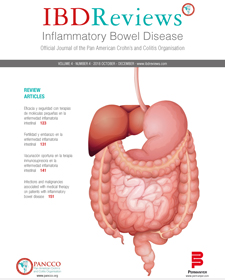Anti-integrin antibodies as biologic therapy for patients with inflammatory bowel disease
Contenido principal del artículo
Resumen
The complex inflammatory cascade that forms part of the pathophysiological mechanisms underlying inflammatory bowel disease (IBD) has been subject of diverse studies since several years ago. Through time, many different molecular pathways have been elucidated and further identified as therapeutic targets for biologic therapy, which has potentially modified the classic therapeutic pyramid and consequently IBD clinical course. The current research has focused in studying and finding new therapeutic targets that allow us to maintain or improve the outcomes obtained with anti-tumor necrosis factor-α biologic agents and avoid or diminish their adverse events and related risks. Integrins and their receptors are particularly interesting and promising therapeutic targets for biologic agents under current clinical trials such as natalizumab, vedolizumab, abrilumab, etrolizumab, anti-MAdCAM-1, or alicaforsen. Here, we discuss and analyze widely the most recent advances in this regard, including the disadvantages and adverse events that we are still facing, ending with a quick look into the future of this type of therapy.

